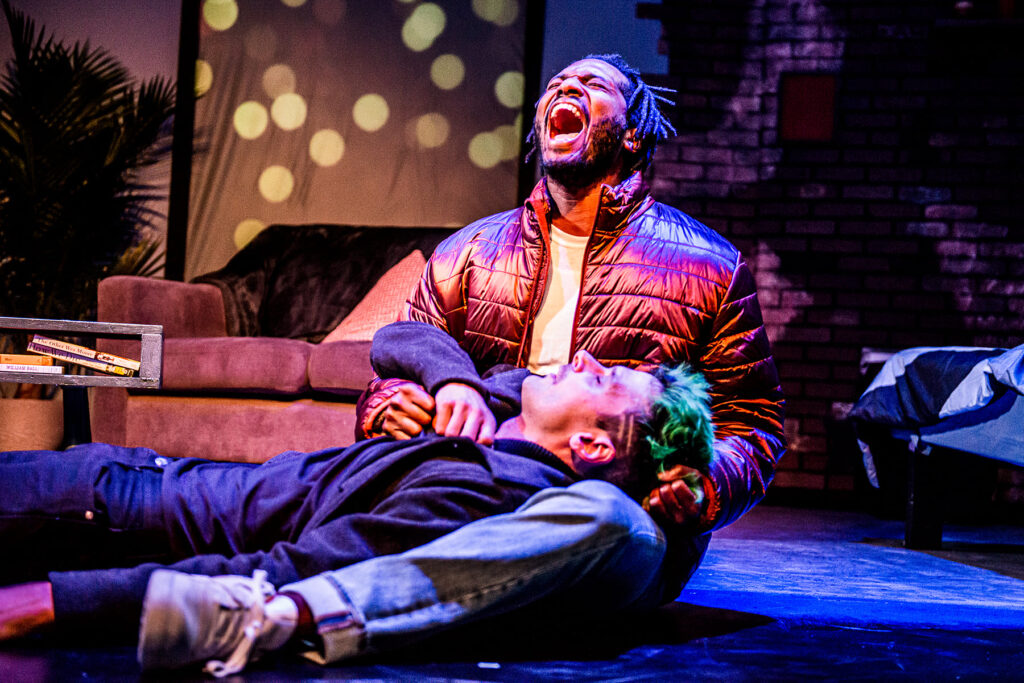Unpopular Opinion: You scrolling on TikTok all night is NOT going to inspire you to create that genius BLM art piece you’ve been dreaming about for the past few months. Do you want to be inspired to change social norms? Then, see RTP’s This Bitter Earth by Harrison David Rivers, a visceral and progressive work of art that successfully juggles the complexities of race, class, sex, gender, religion, and politics, all in a stream of biographical vignettes.
Now, I know watching Karen compilations is entertaining and all, but that’s doing nothing but getting your blood pressure up for no reason. This Bitter Earth also tackles the “White Savior Complex” as you follow Neil Finley-Darden’s journey (played by Evan Nasteff). Neil’s a White activist who carries the burdensome responsibility of educating his Black boyfriend, Jesse Howard (played by Andrew “Rou” Reid), about the trials and tribulations of being a Black man in a White privileged world. The romanticization of Neil’s ignorance about his privilege is so bold that it’s nearly comical. However, even though his knowledge can be obnoxious, Neil’s intention to understand Jesse’s mysticism is beyond adorable. And it doesn’t help that Evan Nasteff emits overflowing charisma that reels you back into falling for the character all over again. Honestly, get you a Karen that can still charm you after pissing you off for the millionth time.
Another fantastic thing that TikTok cannot offer, specifically to Black men in the arts, is a relatable character that touches on hyper-masculinity in the Black community. Jesse, the protagonist who identifies as a Black gay playwright, reveals in a monologue that he’s only dated White men because he feels comfortable with their unapologetic male femininity. In contrast, Black men’s hyper-masculinity can be highly uncomfortable for Jesse. He brought up a great point about how White men can afford to be soft and artistic while Black men cannot be because of White privilege. Privilege is a factor in why Black men are often encouraged to play sports while White men can play make-believe in the arts and possibly not get scolded for being too feminine/soft. And as a Black male playwright who’s always expressed feminine characteristics, I relate to Jesse’s statement. I’ve always felt alone in having to lower my pitch or consciously widen my legs to keep from being confronted by male figures in my life with the question, “You’re not gay, are you?” So, Jesse’s truth was incredibly refreshing to hear.
And ironically, this scene proves my point exactly. When Jesse is finally done with Neil’s existence, Andrew brilliantly uses hyper-masculinity as a tactic to make Jesse leave. And through this, it reveals that Jesse has the capabilities to use his fears on others to get what he wants. It deepens Jesse’s character as a dynamic and multifaceted protagonist. And this is where I need to take a second to appreciate and applaud Andrew “Rou” Reid’s jaw-dropping performance as Jesse Howard. Every gesture, movement, and word from the actor was rich and fluid with exquisite detail.
Though, I would not recommend viewing the virtual live performance as to the multiple sound technicalities. The show was still enjoyable and informational, but nothing revolutionary. And since we are on the topic of you (yes, you!) getting your work out there in the world to change social norms. As artists, we need to encourage one another to think outside of the box by challenging ourselves first before we can demand the world to change in ways that would be uncomfortable for them. So, a question: “What if Neil was Black?” For me, it would eliminate the “White Savior” trope, challenge Jesse’s fear of hyper-masculinity and promote Black love, which is a rarity in entertainment. Now, that would’ve been revolutionary. Well, at least for me. But I want to know what revolutionary means to you. Maybe after seeing TBE, you can post your revolutionary art on TikTok so I can check it out.



